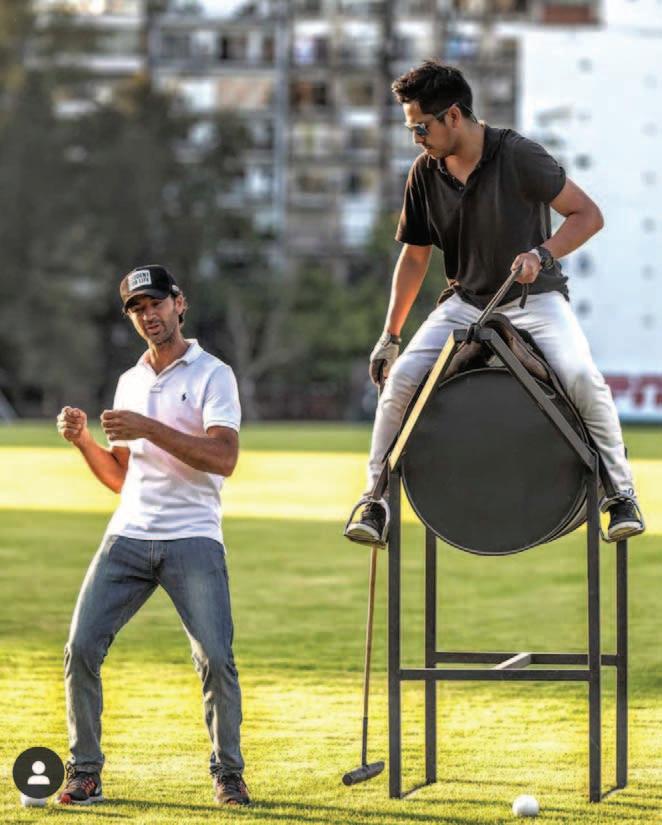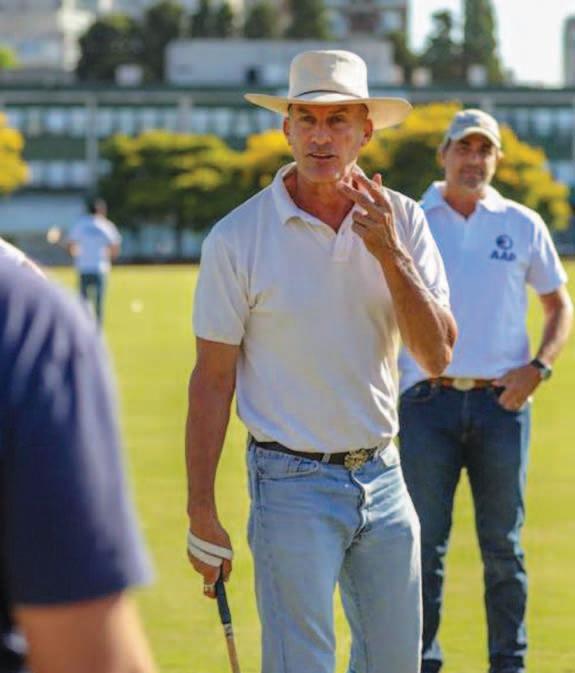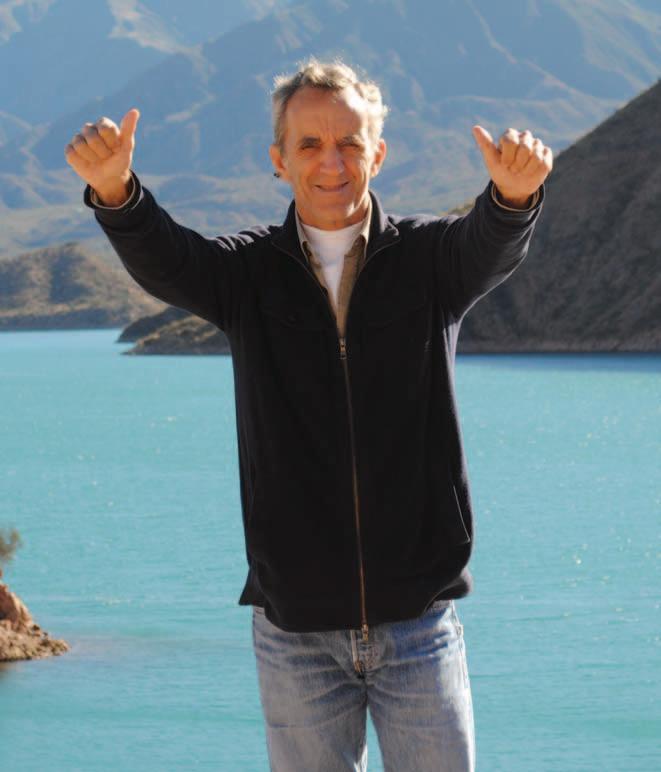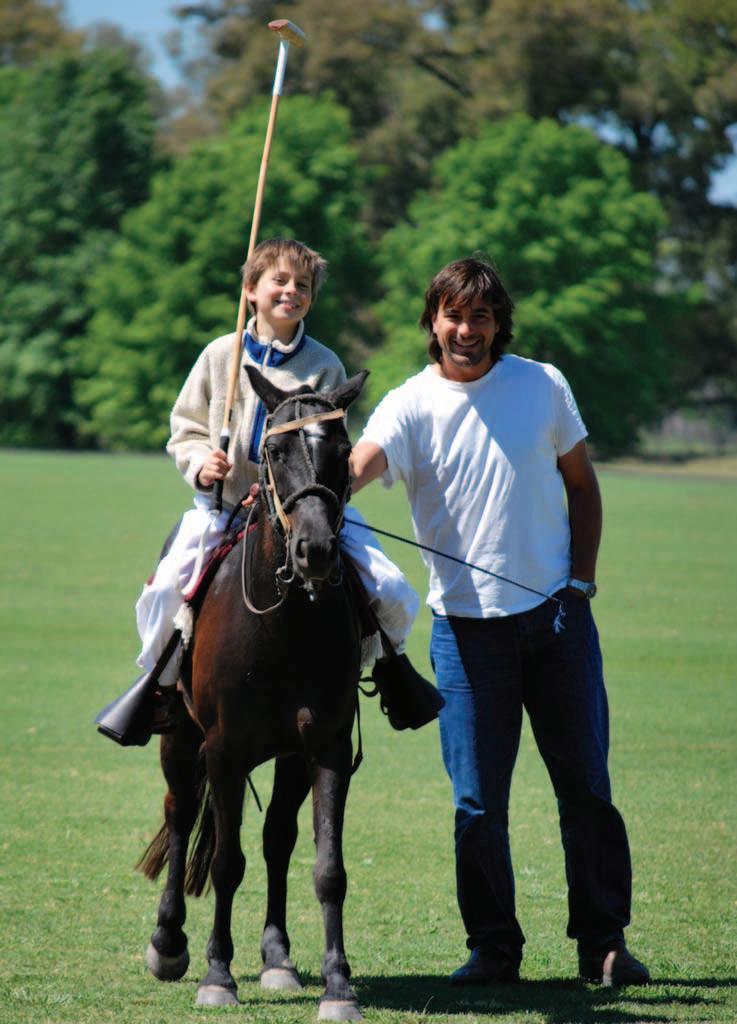
6 minute read
Polo in the Pampas
Polo Zoom Polo4Pro clinics adapted in times of COVID-19
By Lucas Noel
Matias Maiquez with a student
Martin Orozco
Nine coaches formed a group, developing a unique proposal. Polo4Pro brought together the first instructors certified by the Argentine Polo Association to provide clinics on various topics of the game and give life to a solid and broad base for teaching polo. But the social, preventive and mandatory isolation in the face of the pandemic that plagues the world led them to have to reform their methodology. Now, every Friday through the Zoom platform, the instructors present a new way of offering their knowledge about horse riding, breeding, training, the best way of taking penalties and various general concepts. Agustín ‘Tino’ and Miguel Bourdieu, Justo Del Carril, Raúl Laplacette, Matías Maiquez, Santiago Marambio, Santiago Novillo Astrada, Martín Orozco and Eduardo Amaya reveal the success of these virtual meetings that have almost become a live TV show.

How does a polo clinic adapt to a Zoom class?
Although clinics are face-to-face, technology helped us transform it into a zoom class. The eight of us who are in Argentina and Negro (Eduardo) Amaya, who is in Houston, got together and talked about it with the aim that the class serves the listener and can incorporate knowledge. It grew so much we are convinced it will not die when everything returns to normal. These classes are really useful and will continue after the pandemic. They will not be weekly, maybe they will be monthly. But there is going to be an entertaining program coming from the stables aimed at amateur polo. These zoom sessions have given us the opportunity to talk about technique, tactics and the game itself. Polo4Pro is a group of players with different handicaps who have different views and who want to share that diversity. There is no pride among the nine of us. The group is heterogeneous and the challenge is that the new player can receive at least one of the nine opinions and positions that we offer.
Was the growth and adherence expected?
Eduardo Amaya: We have had a very good impact. We are very happy with what is happening. People now have more time to sit and listen. Pay more attention to our recommendations on how to make a horse walk better, how to care for it, etc. There is the guy who lives abroad, who can send us a video for analysis and feedback. Technology gives us that possibility and we are taking advantage of it.
Will you be able to offer clinics again by the end of the year when polo can be played in Argentina?
Raúl Laplacette: We estimate Polo4Pro face-toface clinics will return at the end of September, when the Argentine Polo Association enables tournaments to be held, according to the government’s directives from the Ministry of Health. At this moment, there are locations where polo training is allowed according to sanitation protocols.
What would the protocol be like to carry out clinics with all the health precautions?
Raúl Laplacette: Since the Covid-19 pandemic, classes will be held according to a protocol to avoid contagion. The use of a face coverings, maintaining a social distance of [over 6 feet], frequent handwashing and surface disinfection will be required. We count in our favor that classes are held outdoors and in open spaces with few students.
Tell me about the instructor certification course that gave life to Polo4Pro?
Santiago Novillo Astrada: The course for instructors was an initiative of the president of the Argentine Polo Association, Eduardo Novillo Astrada, who realized our country lacked an
organization in this area. In countries like England and the United States, they implemented it years ago with very good results, but Argentina, the country with the best polo players in the world, needed to set up an instructional structure.
Many people who were already dedicated to teaching were summoned and the idea was to give us tools to improve the forms. Within this group of 70 applicants, eight were selected, all with more than 20 years of experience teaching polo and playing as professionals around the world with a minimum of 5- goal handicaps. We realized together we could build something bigger and empower each other. We held several meetings with the AAP to further strengthen the project and from there emerged the first eight instructors certified and approved by the AAP.
How did you develop the idea?
Martín Orozco: While we were still in the certification course, they commissioned us to do some practical work. With Raúl Laplacette, Santi Novillo Astrada and Justo Del Carril we started to work and realized that, due to the different characteristics we had, an interesting dynamic was formed. Justo specializes in the grip, Santi and Raúl are more dedicated to the swing and I to horsemanship. we realized we complemented and empowered each other. Justo proposed breaking with what has been the historical way of teaching polo.
Polo students were always handled individually, there were no companies or work groups. That is why we made that decision. Last year, we worked very well, and we realized there was room to expand and invite more people. So, we went in search of the experience of Miguel and Tino Bourdieu, and we were interested in two young people who are in full activity like Matías Maiquez and Santi Marambio. They open the doors to the whole technological and communication world. When we decided to open up to the world, we turned to Negro Amaya, a reference for us abroad who could give us a different and broader approach. He is not only a vet, professional polo player and instructor for many years, but also has clarity of concepts and ease of exploration from which we learn every day.
Who are the clinics for?
Miguel and Tino Bourdieu: Polo4Pro tries to reach all polo players and future polo players. The main objective is to improve the polo level of the players. The low handicap has been the most neglected level in teaching and, therefore, we proposee to channel all the effort in a first stage. A low-handicap player has a much better chance of improvement than an elite player. You just need people with experience who have played a lot of polo around the world and pass on the knowledge to them. That is the basis of our clinics: our experience at the service of the player. Miguel Bourdieu
What do you need to get started?
Martín Orozco: Basically, and essentially, the desire to learn or improve, depending on the level of the player. We give classes to professionals who want to improve something in particular the same as amateur players and even people who have never ridden a horse. We do make one thing clear to them: they embark on something that there is no return. Once you start playing there is no return. You just need enthusiasm and respect for the horse.
How do you reach your clients and students?
Santiago Marambio and Matías Maiquez: Nowadays, social networks are a very effective way to communicate. Both Facebook and Instagram are mainly part of the Polo4Pro base, which was joined by several sponsors looking for something new Santiago Novillo Astrada to teach polo and thus increase the number of followers and participants in the talks.
Polo4Pro created a totally innovative base in which the participants feel protagonists and identified with a way of learning with freshness, versatility, brotherhood, charisma, fun and this is also educational. The brand has an identity, something necessary for the success and development of a product, and which is also launching its website soon.


Polo4Pro is still a developing concept. However, its growth has allowed it to devise a truly ambitious initiative: to create a high-level education and training center with several locations in Argentina and the main countries where the sport is played. •










